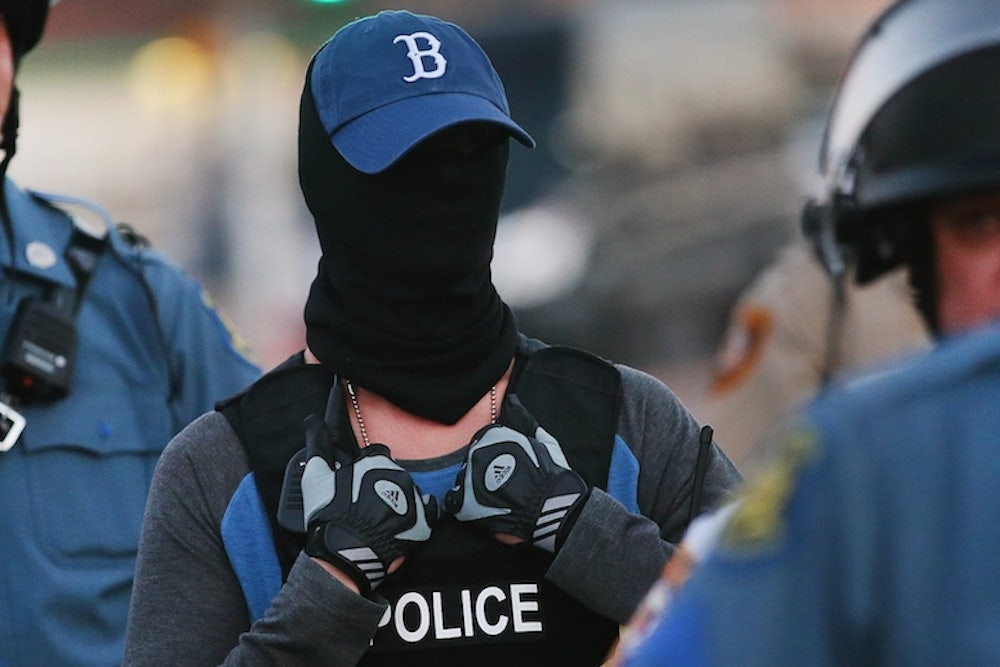In his brief remarks Thursday on the alarming standoff in Ferguson, Missouri, between protesters angry over the police shooting of an unarmed black teenager and heavily armed cops sent out to confront them, President Barack Obama declared: “Now is the time for an open and transparent process to make sure justice is done.” It was a pointed remark, given that the process in Ferguson has been notably un-transparent in at least one key regard so far: Its police department refused all week to release the name of the officer who killed 18-year-old Michael Brown, saying that doing so would put the officer’s life at risk, before finally relenting to pressure Friday morning and identifying the shooter as a six-year veteran of the force named Darren Wilson.
The department’s concerns are not outlandish, given how volatile the situation in Ferguson has gotten, and the law in this area is murky. There are no federal laws governing the disclosure of police records, and state standards differ widely, as Jonathan Peters spells out in a helpful explainer for the Columbia Journalism Review. Missouri’s Sunshine Law states that “except if any portion of a record or document of a law enforcement officer or agency, other than an arrest report, which would otherwise be open, contains information that is reasonably likely to pose a clear and present danger to the safety of any victim, witness, undercover officer, or other person … that portion of the record shall be closed and shall be redacted from any record made available.” A few lines later, it states: “In making the determination as to whether information contained in an investigative report shall be disclosed, the court shall consider whether the benefit to the person bringing the action or to the public outweighs any harm to the public, to the law enforcement agency or any of its officers.” There’s plenty of gray area there.
But the lack of disclosure in Ferguson goes beyond the officer’s name: Authorities have also refused to release the initial autopsy report, or even stated the number of shots fired. And this lack of transparency fits into a disconcerting trend in which police departments are increasingly leaving the release of basic information up to their own discretion. Back in my days as a cub reporter at newspapers in New England and Brooklyn, covering the crime beat was straightforward: You went into the police headquarters or precinct house and asked to see that day’s or week’s incident reports, which were complete with the identity or description of the arrestee or suspect, a full description of the incident in the handwritten scrawl of the officer, and, yes, the name of the officer. But I hear from my former colleagues in the daily newspaper business that police departments increasingly have taken what used to be an automatic disclosure of such records—to the point of just leaving them sitting on the front counter for easy perusal—and turned it into a area of constant contention. Whereas before it was their duty to disclose, now it’s seen as their prerogative to decide what they feel like disclosing on any given day.
So you have confrontations like the one that occurred recently on the Eastern Shore of Maryland, where the Ocean City police department refused to release the name of a 17-year-old who died in a drowning incident. The editor of the Delmarva Daily Times wrote a column strongly protesting the decision as a threat to government accountability: “A simple fact. It is the responsibility of police departments to release details of public accidents and incidents. That responsibility is enshrined in open government laws that exist in Maryland and in each and every state. It is why you certainly have read the name of every accident victim on the Delmarva Peninsula in recent years.” Also in Maryland, the Baltimore police department announced in 2009 that it would no longer be releasing the name of any police officers who shoot civilians—regardless of whether or not the incidents are as volatile as the Ferguson one has become. This was a consequential shift in a city where, the year before the decision, the police had shot 21 people, 13 of them fatally. Some local leaders protested, saying this would only worsen community-police relations, but to no avail. Earlier this year, the city’s police commissioner simply stopped speaking to the Baltimore Sun’s dogged crime reporter, Justin Fenton.
What is behind this move away from disclosure? I suspect two separate dynamics are at play. One is related to the same self-aggrandizement that has led local law enforcement agencies to load up on military-style heavy weaponry and armor—the more that local police view themselves as engaged in the grand project of “homeland security,” the more they feel justified in mimicking the national security state’s penchant for secrecy. The other dynamic is the withering of local journalism. The fewer reporters there are engaged in routine coverage of the cop beat, the more likely police are to start viewing requests for information as a rare and nettlesome importunity that can be tolerated or rejected as the department sees fit, rather than as something to be honored as a matter of course.
Regardless of the cause, though, this is a tendency that must be resisted, both for the transparent functioning of government and for the prevention of scenes like the one playing out in Ferguson. The protesters are angry not just that an unarmed teenager was shot, but that the police are so fiercely guarding details of the shooting that is not theirs to guard. It is not just public information—it is part of a public trust.
This post has been updated.
